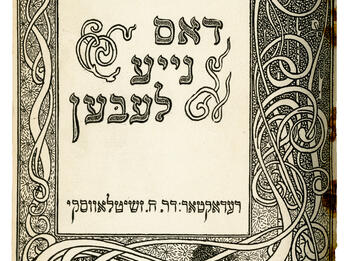The Eighth Party Convention
Whereas the legislation regarding linguistic rights currently being considered by the Duma1 directly opposes the interests of the proletariat and the masses of the Jewish nation; and whereas this question is of special urgency to the Jewish workers, in that Yiddish is a denigrated, persecuted language, the Conference believes that it is necessary to raise and forcefully pursue the following demands: (1) The division of languages [as proposed in the legislations before the Duma] into two categories, dominant and tolerated, is unacceptable. (2) All governmental institutions—central, regional and local—must use the local languages when dealing with the population. (3) This demand must be fulfilled by means of special legislation and legal guarantees. (4) Until the realization of national-cultural autonomy which will transfer responsibility for educational and cultural matters to the nations themselves, it is necessary to work for the establishment of a government school for each national group in the general population in which its own language will be used. (5) All limitations on the use of one’s mother tongue in public life, assemblies, the press, business institutions, schools, et cetera must be abolished.
In the struggle to achieve these demands, it is necessary to secure the rights of the Yiddish language, which is denied these rights more than any other language and, moreover, is not even officially recognized, while the other non-dominant languages receive at least partial recognition.
While making clear its reservations about those nationalist trends which turn the struggle for Yiddish into an instrument with which to blunt the class consciousness of the proletariat, Jewish Social Democracy, considering the interests and needs of the proletariat, must conduct the struggle against the assimilationists and the Hebraists so that the Yiddish language will acquire in all areas of Jewish public life—especially, in the schools and cultural institutions—the prominent position it merits as the national language of the Jewish people. (Adopted unanimously.)
Notes
Words in brackets appear in the original translation.
The Duma was the Imperial Russian legislature in existence between 1906 and 1917.
Credits
Published in: The Posen Library of Jewish Culture and Civilization, vol. 7.



